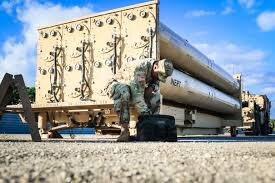U.S. THAAD gamble: Moving up the escalation ladder

TEHRAN – The reported deployment of American military personnel to operate Terminal High Altitude Area Defence (THAAD) systems in Israel, a move under consideration by the Biden administration, has once again thrust Israel's actions onto the centre stage of tensions in West Asia.
While the U.S. already provided Israel with THAAD systems in 2019, this proposed change — stationing American personnel to operate the system — marks a significant escalation, raising serious concerns about the potential for a direct confrontation with Iran.
This move, fueled by Israel's perceived security threats from Iran and its allies, is seen as a blatant escalation by many observers. It comes at a time when tensions in the region are already high, with Israel's aggressive policies, including airstrikes in Lebanon, Syria, and Gaza, contributing significantly to the volatile situation.
The presence of American personnel to operate the THAAD systems would inevitably be viewed by Iran and its allies as a direct provocation. Critics argue that this move, coupled with Israel's consistent push for military action, risks igniting a wider regional conflict, potentially drawing the U.S. into a direct confrontation with Iran.
Many experts argue that the deployment of THAAD, in conjunction with Israel's recent aggressive actions, is a clear attempt to leverage American military power and entrench Israel's security interests in the region. This move, they argue, is a reckless gamble, potentially jeopardizing regional stability and dragging the U.S. into a conflict that it may not be prepared for.
The decision to deploy American personnel to operate THAAD, therefore, raises serious questions about Israel's reckless pursuit of security, often at the cost of regional peace and stability. Critics argue that Israel's actions, particularly its constant escalation of tensions and reliance on American military intervention, are a key driver of instability in the region.
The potential consequences of this move are far-reaching and potentially catastrophic. The presence of American personnel operating advanced military systems in Israel could trigger a domino effect, leading to further militarization of the region and increasing the likelihood of unintended escalation. This, in turn, could lead to a regional conflict with unpredictable consequences, ultimately drawing the U.S. into a protracted and costly conflict.
Adding to the already complex situation, Iranian officials, including Foreign Minister Abbas Araghchi, have explicitly declared that "Iran does not want war, but nor is it afraid of it." This statement, while intended to deter potential aggression, also serves as a stark warning about the potential consequences of actions perceived as hostile.
The United States' decision to station personnel in Israel, therefore, creates a dangerous situation. It not only raises the risk of a direct confrontation with Iran, but also makes American military facilities in the region legitimate targets for a potential Iranian response.
The Biden administration, however, maintains that the deployment is a necessary measure to protect American interests in the region. They argue that the move is a demonstration of the U.S.'s commitment to the security of its allies. However, this rationale fails to address the deeper concerns regarding Israel's own role in escalating tensions and its reliance on American military intervention as a means of securing its interests.
The potential for a catastrophic conflict remains real. The international community must closely monitor the situation and engage in diplomatic efforts to prevent a dangerous escalation of hostilities. Israel's aggressive actions, particularly its constant push for military solutions, are a major threat to regional stability. It is essential to address the underlying causes of tension to prevent a potential military confrontation with catastrophic consequences.
